Allergies are a common issue that affects millions of people every year. While we often think of outdoor triggers like pollen and pollution, indoor allergens can be just as problematic, if not more so.
Carpets, in particular, can accumulate allergens, negatively impacting indoor air quality and making allergy symptoms worse.
If you suffer from allergies, maintaining a clean living environment is crucial. One effective yet often overlooked method to improve indoor air quality is regular carpet cleaning.
Carpets act like sponges, trapping dust mites, pet dander, pollen, and other allergens that can trigger sneezing, coughing, itchy eyes, and even asthma attacks.
However, with consistent and proper carpet maintenance, you can significantly reduce these allergens and enjoy a healthier home.
In this article, we’ll explore how regular carpet cleaning can provide much-needed allergy relief for sufferers by improving indoor air quality. We’ll delve into the types of allergens commonly found in carpets, the health impacts of dirty carpets, and the benefits of keeping them clean. Finally, we’ll offer practical advice on the best carpet cleaning practices to ensure your home remains as fresh and clean as possible.
Common Allergens Found in Carpets

Carpets can trap a variety of allergens that affect indoor air quality and trigger allergy symptoms.
These allergens accumulate over time, becoming embedded deep within carpet fibers. This creates a concealed buildup of particles that can be released into the air with everyday activities.
This makes carpets a significant contributor to indoor allergen levels, especially in homes with pets or high foot traffic.
Here are some common allergens found in carpets:
Dust Mites
These microscopic creatures thrive in warm, humid environments and feed on dead skin cells. Carpets provide an ideal habitat for dust mites.
Pet Dander
Tiny flecks of skin shed by cats, dogs, and other animals with fur or feathers can accumulate in carpets.
Pollen
Pollen from trees, grasses, and weeds can be tracked indoors and settle into carpet fibers.
Mold Spores
Moisture in carpets can lead to mold growth, and mold spores can become airborne, contributing to respiratory problems.
How Carpets Trap Allergens
Carpets act like giant filters, trapping allergens and other particles that settle from the air. While this can help keep the air cleaner initially, over time, these particles build up and can be released back into the air through activities like walking, vacuuming, or children playing. This release of allergens can worsen indoor air quality and exacerbate allergy symptoms.
The Health Impact of Dirty Carpets
Dirty carpets can have a significant impact on health, especially for those who suffer from allergies or respiratory issues.
When carpets are not regularly cleaned, they become a breeding ground for allergens and pollutants that can be easily disturbed and inhaled during daily activities.
This constant exposure to allergens can lead to a range of health problems, from immediate allergy symptoms to long-term respiratory issues.
Allergy Symptoms Triggered by Dirty Carpets
Dirty carpets can significantly impact health, particularly for those with allergies. Common symptoms include sneezing, coughing, itchy eyes and asthma attacks and can be triggered by allergens in carpets.
Sneezing
Frequent sneezing is a common reaction to dust mites and other allergens.
Coughing
Inhaling allergens can irritate the respiratory system, leading to persistent coughing.
Itchy Eyes
Allergens like pet dander and pollen in carpets can cause itchy, watery eyes.
Asthma Attacks
For asthma sufferers, dirty carpets can trigger asthma attacks, characterized by wheezing and shortness of breath.
Long-Term Health Effects
Over time, exposure to allergens in dirty carpets can lead to more severe health issues.
Chronic Respiratory Problems
Continuous exposure to allergens can cause long-term respiratory problems, including chronic bronchitis and other lung conditions.
Worsening of Allergy Symptoms
Constant exposure to allergens can make allergy symptoms more severe and frequent.
Impact on Immune System
Prolonged exposure to allergens can weaken the immune system, making the body more susceptible to infections and other health problems.
Regular carpet cleaning is essential not only to alleviate immediate allergy side effects but also for preventing long-term health issues. By keeping carpets clean, you can create a healthier living environment and improve overall well-being.
Benefits of Regular Carpet Cleaning

Regular carpet cleaning is more than just an aesthetic choice; it plays a crucial role in maintaining a healthy living environment, especially for allergy sufferers.
We have an article on HOW OFTEN you should be cleaning your carpets, but below are some of the key benefits of keeping carpets clean.
Reduction of Allergens
Regular carpet cleaning effectively removes allergens such as dust mites, pet dander, pollen, and mold spores from the carpet fibers. By reducing the allergen load in your home, you can significantly decrease the triggers for allergy symptoms, leading to a more comfortable living space.
Improvement in Air Quality
Clean carpets contribute to better indoor air quality. When carpets are free of dirt and allergens, there are fewer particles to become airborne and circulate through the home. This results in cleaner, fresher air, which is particularly beneficial for those with respiratory conditions such as asthma.
Health Benefits
Maintaining clean carpets offers numerous health benefits. Beyond the immediate relief of allergy symptoms, clean carpets create a healthier home environment that supports overall well-being.
Below are some of the key health benefits of regular carpet cleaning.
Relief from Allergy Symptoms
With fewer allergens in the environment, symptoms like sneezing, coughing, and itchy eyes are less likely to occur.
Improved Respiratory Health
Clean air means less strain on the respiratory system, reducing the risk of asthma attacks and other breathing problems.
Overall Well-Being
A clean home environment contributes to better overall health and well-being, helping you feel more comfortable and less stressed.
Regular carpet cleaning not only enhances the appearance of your home but also ensures a healthier, safer living space for you and your family.
Best Practices for Carpet Cleaning to Remove Allergens
To maintain a healthy and allergen-free home, it’s essential to follow best practices for carpet cleaning. Here are some effective methods:
Routine Vacuuming
Routine vacuuming is a crucial aspect of maintaining clean wall to wall carpeting and ensuring a healthy indoor environment.
Regular vacuuming helps to remove surface dirt, dust, and allergens before they have a chance to settle deep into the carpet fibers. By keeping up with a consistent vacuuming schedule, you can prevent the buildup of allergens and maintain better indoor air quality.
Frequency
Vacuum your carpet, especially in high-traffic areas, at least twice a week and other areas at least once a week. Homes with pets or allergy sufferers may require more frequent vacuuming.
Technique
Use a HEPA filter vacuum to trap small particles. Make several slow passes over each section of the carpet, focusing on high-traffic areas and spots where pets frequently rest.
Professional Carpet Cleaning
While routine vacuuming is essential, professional carpet cleaning provides a deeper clean that can effectively remove embedded dirt and allergens.
Professional cleaning uses specialized equipment and techniques that are not available with standard home cleaning methods, ensuring a thorough clean that extends the life of your carpets.
Importance
Professional carpet cleaners use advanced equipment and techniques to reach deep into carpet fibers, effectively removing dirt, allergens, and carpet stains that regular vacuuming can’t.
Recommended Frequency
Schedule professional carpet cleaning at least once a year, preferably every four to six months for homes with pets, children, or allergy sufferers.
DIY Carpet Cleaning Methods
In addition to routine vacuuming and professional cleaning, there are safe and effective home remedies and cleaning solutions you can use.
Baking Soda
Sprinkle baking soda on the carpet, let it sit for 10 to 15 minutes, and then vacuum. Baking soda helps neutralize odors and absorb moisture.
Vinegar Solution
Mix equal parts white vinegar and water in a spray bottle. Lightly mist the carpet to help disinfect and deodorize it. Test a small area first to ensure it doesn’t affect the carpet color.
Club Soda for Stains
Dab club soda on a fresh stain, then blot with a clean cloth. This can help lift the stain without harsh chemicals.
Fresh Dry Carpet Cleaning Spotter
Apply Fresh Dry Carpet Cleaning Spotter to stains, let it sit for a few minutes and then blog with a clean cloth. Test a small area first to avoid discoloration. Get your bottle of our spotter today.
By following these best practices, you can maintain clean carpets that contribute to better indoor air quality and a healthier home environment.
Key Takeaways
Regular carpet cleaning is essential for maintaining a healthy and allergen-free home.
By understanding the common allergens found in carpets and the health impacts of dirty carpets, you can take proactive steps to improve your indoor air quality.
Routine vacuuming, professional carpet cleaning, and effective DIY methods all contribute to reducing allergens and creating a healthier living environment.
By following these best practices, you can enjoy the many health benefits of clean carpets, including relief from allergy symptoms, improved respiratory health, and overall well-being.
Keep your carpets clean and your home will be a safer, more comfortable place for you and your family.

